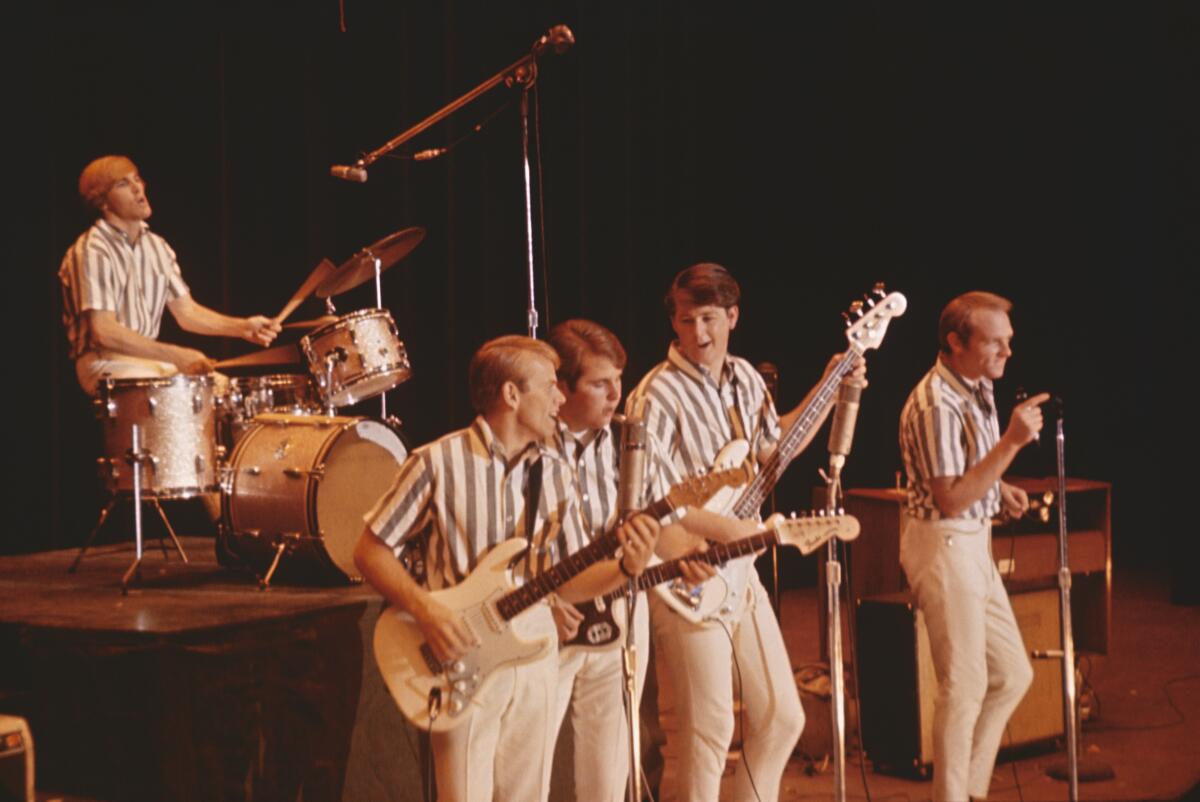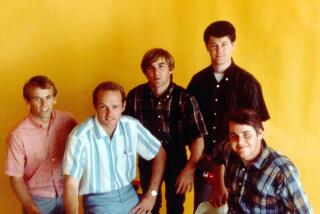The Beach Boys’ Al Jardine remembers Brian Wilson: ‘I’m still learning from him after all these years’

- Share via
The death of Beach Boys founder Brian Wilson is an immeasurable loss for music and for California, both the place and the dream of it that Wilson conjured with his regal and tender compositions.
Wilson was the visionary of the defining American rock band, one who competed with the Beatles to move pop music into new realms of sophistication and invention, while writing songs capturing the longing of an ascendant youth culture.
His death leaves only two surviving members of the original lineup — Mike Love and Al Jardine, Wilson’s high school friend who sang lead on early hits like “Help Me Rhonda” and wrote songs for beloved later-period albums like “Surf’s Up” and “Sunflower.”
On the day the world learned of Wilson’s death, Jardine briefly spoke to The Times to remember his lifelong friend and bandmate. The guitarist, vocalist and songwriter — now on tour with his Pet Sounds Band playing Beach Boys hits with a focus on their 1970s output — looked back on six decades of writing and performing with one of the greatest minds of popular music.
Jardine’s conversation was edited for length and clarity.
Brian Wilson, the musical savant who scripted a defining Southern California soundtrack with a run of hit songs with the Beach Boys, has died. He was 82.
I just lost my best friend and mentor. It’s not a good feeling, but I’m going to carry on and continue to play our music and perform with the Pet Sounds Band.
Brian was a great friend. We grew up together, we went to high school together. We were both dropouts, which is not a bad thing as long as you have a vision of the future. His and mine was to make music.
We were very good friends and very successful in part because of his great talent. He had an amazing ability to compose, very simple things and very complex things, all at the same time. He was a visionary.
We all grew up together musically, but he grew exponentially. He became a leader, and formed new ways of chord construction, things no one had heard before, and we rose to the challenge with him.
It’s been said that Brian invented the state of California, the state of mind. That’s a cute way of saying it, but he really invented a new form of music in the ’60s and ’70s. It was very sophisticated, but went way beyond that. He was a humble giant, a great American composer.
Wilson leaves a singularly inventive, exultant body of work that scripted California to the world.
I don’t think anyone else could walk in his shoes, given all that he went through. I did write some songs he liked, and did help him get through treacherous times. It must be so frightening to be left in the wilderness by yourself and not know how to get home. He said one song I wrote helped him get through that, which is quite a compliment from the great Brian Wilson, who had his own demons to deal with.
Brian Wilson’s band was a reawakening of his professional life. He never enjoyed touring, so this band was a whole new life for him, to experience his own music and an adulation that he never had before.

His legacy is of course in the music, and any interpreter of that legacy has to be sharp and devoted to it. We have the most devoted people that could be there to do that, so many original members of his band. My son Matthew, he’s Brian’s voice, and the DNA is there. With his arranger, Darian, arranging all vocals, we have all the muscle and genius to pull it off.
When Carl Wilson and I were singing those parts back then, we’d abbreviate things — you can’t do everything you did in the studio with only five of us. Now we’ve got 10 people onstage and I just heard some background parts yesterday that sounded just like we used to — you can hear Carl and Dennis in there.
Wilson, who died Wednesday at 82, was one of music’s true visionaries, if that’s the right word for a guy who dealt in the endless possibility of sound.
When we take the band out, I have a little white piano onstage, like the one he played in the past. It’s a symbolic moment, the empty piano.
While the Beach Boys tour was a hit-based performance, with this iteration, we’re more introspective, deeper cuts, performing much of the 1970s catalog. There’s quite a few numbers the public hasn’t heard, exploring the heart and soul of those albums. I was hoping Brian would have been able to join us.
But it’s wonderful, we’re hoping this music should last forever, and be felt at the deep levels that Brian experienced it.
It sure is a great responsibility to play it, but it just feels natural to me. I’ve been doing it for so long, It doesn’t feel weighty. I’m confident, especially with this band being so remarkable. I’m still learning from Brian after all these years.
More to Read
The biggest entertainment stories
Get our big stories about Hollywood, film, television, music, arts, culture and more right in your inbox as soon as they publish.
You may occasionally receive promotional content from the Los Angeles Times.














